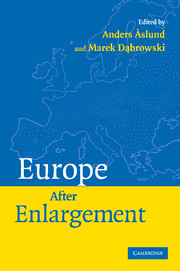Book contents
- Frontmatter
- Contents
- List of Charts, Tables, and Boxes
- Contributors
- Acknowledgments
- Introduction
- 1 Has Europe Lost Its Heart?
- 2 Economic Implications of the Social Provisions of the Stalled EU Constitution
- 3 Fiscal Policy and Fiscal Rules in the European Union
- 4 Design and Implementation of the Stability and Growth Pact: The Perspective of New Member States
- 5 Perspectives on the Lisbon Strategy: How to Increase European Competitiveness
- 6 Is Europe Reforming? Evidence from Cross-Country Structural Indicators
- 7 Recovery Growth as a Stage of Post-Socialist Transition
- 8 Comparative Oligarchy: Russia, Ukraine, and the United States
- 9 The Economic Rationale of the “European Neighbourhood Policy”
- 10 Economic Integration of Eurasia: Opportunities and Challenges of Global Significance
- Index
- References
3 - Fiscal Policy and Fiscal Rules in the European Union
Published online by Cambridge University Press: 04 December 2009
- Frontmatter
- Contents
- List of Charts, Tables, and Boxes
- Contributors
- Acknowledgments
- Introduction
- 1 Has Europe Lost Its Heart?
- 2 Economic Implications of the Social Provisions of the Stalled EU Constitution
- 3 Fiscal Policy and Fiscal Rules in the European Union
- 4 Design and Implementation of the Stability and Growth Pact: The Perspective of New Member States
- 5 Perspectives on the Lisbon Strategy: How to Increase European Competitiveness
- 6 Is Europe Reforming? Evidence from Cross-Country Structural Indicators
- 7 Recovery Growth as a Stage of Post-Socialist Transition
- 8 Comparative Oligarchy: Russia, Ukraine, and the United States
- 9 The Economic Rationale of the “European Neighbourhood Policy”
- 10 Economic Integration of Eurasia: Opportunities and Challenges of Global Significance
- Index
- References
Summary
Introduction
In his revolutionary work, the godfather of modern fiscal policy Lord Maynard Keynes gave a central role to discretion in fiscal policy. Thus, in some ways, he, and even more his followers, who probably pushed his ideas beyond where he would have liked, gave policy makers what many of them had always wanted: a justification for spending more or, in particular cases, for reducing taxes without cutting public spending. A correct or effective discretionary fiscal policy is, however, difficult to pursue because it requires information and attitudes that are often in short supply. When countries try to fine-tune their fiscal policy, they often end up making mistakes. This chapter focuses on those difficulties within the European context. It discusses problems that have not received the attention that they deserve.
Since it was first proposed, and then endorsed by the Keynesians, with a revolutionary fervor that at times paralleled that of true religious believers, countercyclical fiscal policy has been subjected to occasional criticism. Three major lines of criticism can be distinguished.
First is the existence of various lags. It was noticed from the beginning that there are likely to be lags in (1) the recognition that fiscal action is needed, (2) the taking of the action, and (3) the time that passes between when the action is taken and when the economy begins to feel its effects. These lags reduce the effectiveness of countercyclical policy.
- Type
- Chapter
- Information
- Europe after Enlargement , pp. 50 - 64Publisher: Cambridge University PressPrint publication year: 2007
References
- 4
- Cited by



